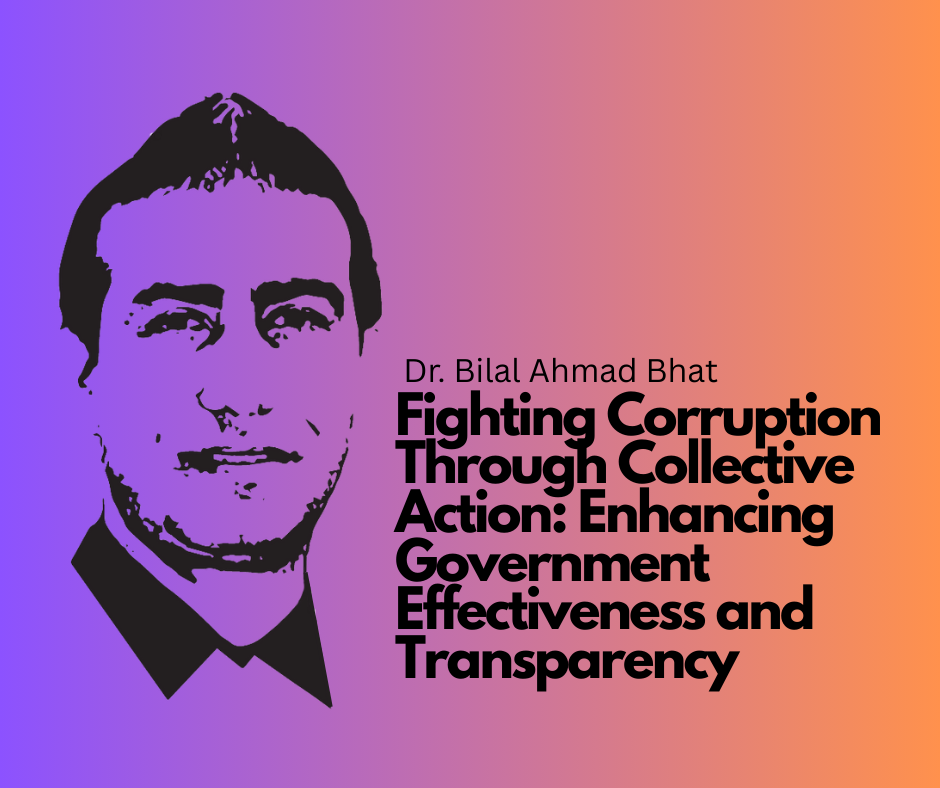Corruption, a pervasive and insidious challenge faced by societies globally, undermines trust in institutions, distorts economic systems, and erodes public confidence in governance. Dr. Bilal Ahmad Bhat, a staunch advocate for transparency and integrity, delves into the imperative of collective action in combating corruption. This article explores strategies to enhance government effectiveness and transparency, emphasizing the pivotal role of citizens, civil society, and ethical leadership in fostering a culture of integrity and accountability.
Understanding the Impact of Corruption
Corruption manifests in various forms, including bribery, embezzlement, nepotism, and favoritism, and has far-reaching consequences:
Economic Impact: Corruption hampers economic growth, deters investment, and distorts market mechanisms, leading to inefficiencies and inequality.
Social Cost: Corruption exacerbates social inequalities, impedes access to basic services such as healthcare and education, and undermines trust in public institutions.
Political Instability: Corrupt practices erode democratic principles, weaken the rule of law, and contribute to political instability and social unrest.
Global Implications: Cross-border corruption, money laundering, and illicit financial flows have international ramifications, necessitating global cooperation to combat these challenges effectively.
Enhancing Government Effectiveness and Transparency
Effective governance and transparency are fundamental pillars in the fight against corruption. Dr. Bilal Ahmad Bhat outlines key strategies to enhance government effectiveness and promote transparency:
Strengthening Institutions: Building strong and independent institutions with clear mandates, adequate resources, and mechanisms for oversight and accountability is essential.
Legal Reforms: Enacting and enforcing anti-corruption laws, whistleblower protection measures, and asset recovery frameworks strengthens legal frameworks and deters corrupt practices.
Digital Solutions: Leveraging technology for e-governance, digital payments, and online public services promotes transparency, reduces bureaucratic hurdles, and minimizes opportunities for corruption.
Open Data Initiatives: Implementing open data policies, transparency portals, and citizen engagement platforms enhances public access to information, fosters accountability, and empowers citizens to monitor government activities.
Ethical Leadership: Cultivating a culture of ethical leadership, merit-based appointments, and zero tolerance for corruption within government agencies sets a positive tone and example for integrity in governance.
The Role of Collective Action in Combating Corruption
Collective action involves collaboration among government entities, civil society organizations, businesses, media, and citizens to address corruption comprehensively:
Citizen Participation: Empowering citizens through education, awareness campaigns, and civic engagement initiatives enables them to actively participate in anti-corruption efforts, report corrupt practices, and demand accountability.
Civil Society Oversight: Civil society organizations serve as watchdogs, advocating for transparency, monitoring government activities, and promoting accountability through research, advocacy, and public campaigns.
Media Vigilance: Independent and investigative journalism plays a crucial role in exposing corruption, raising public awareness, and holding authorities accountable through investigative reports and media campaigns.
Business Integrity: Encouraging businesses to adopt ethical practices, anti-corruption compliance measures, and corporate social responsibility initiatives contributes to a culture of integrity in the private sector.
Conclusion: Advancing Integrity and Accountability
In conclusion, Dr. Bilal Ahmad Bhat underscores the transformative potential of collective action in fighting corruption. By enhancing government effectiveness, promoting transparency, and mobilizing collective efforts across sectors, societies can cultivate a culture of integrity, accountability, and good governance. Through collaborative endeavors and a steadfast commitment to ethical leadership, we can build a more just, transparent, and prosperous future for generations to come.




